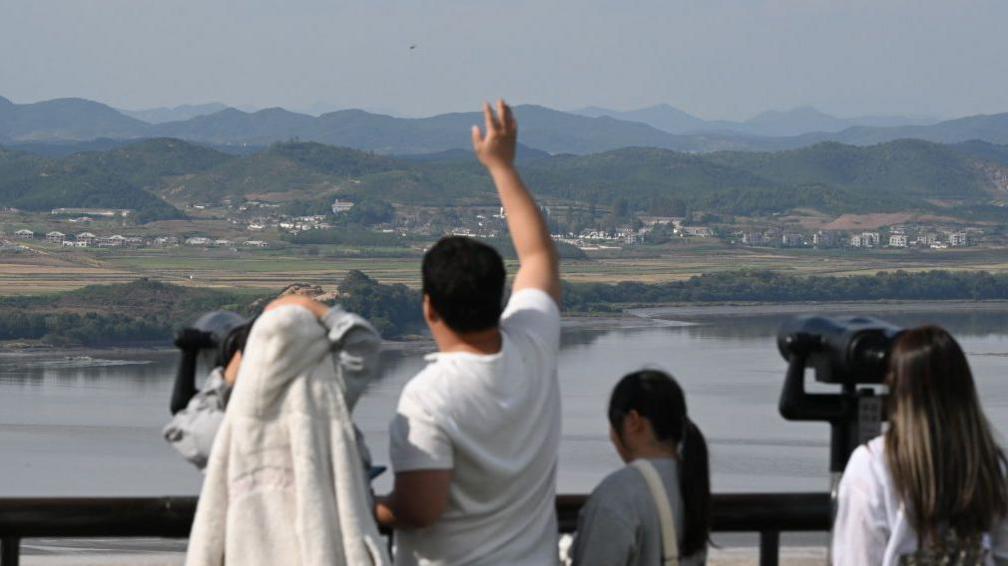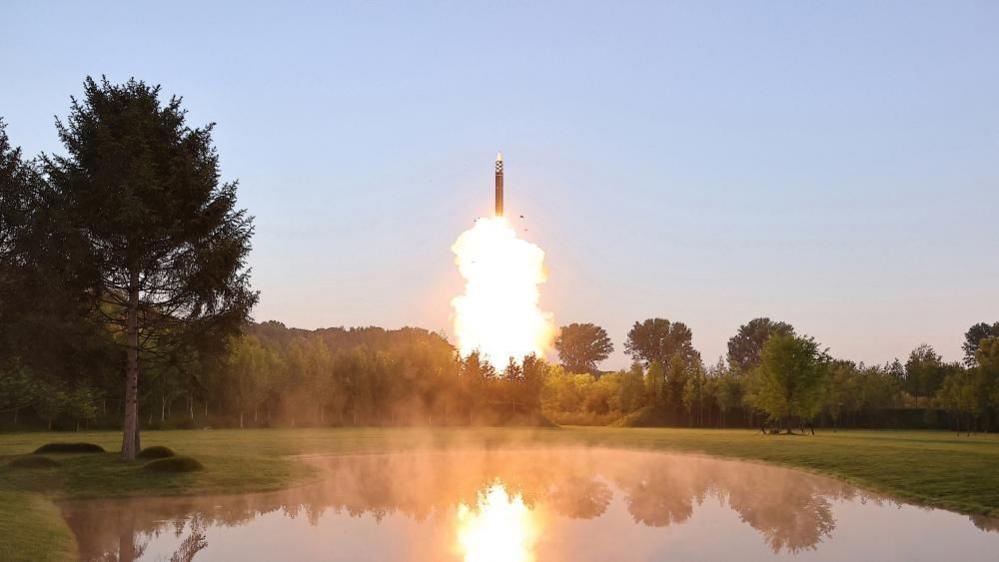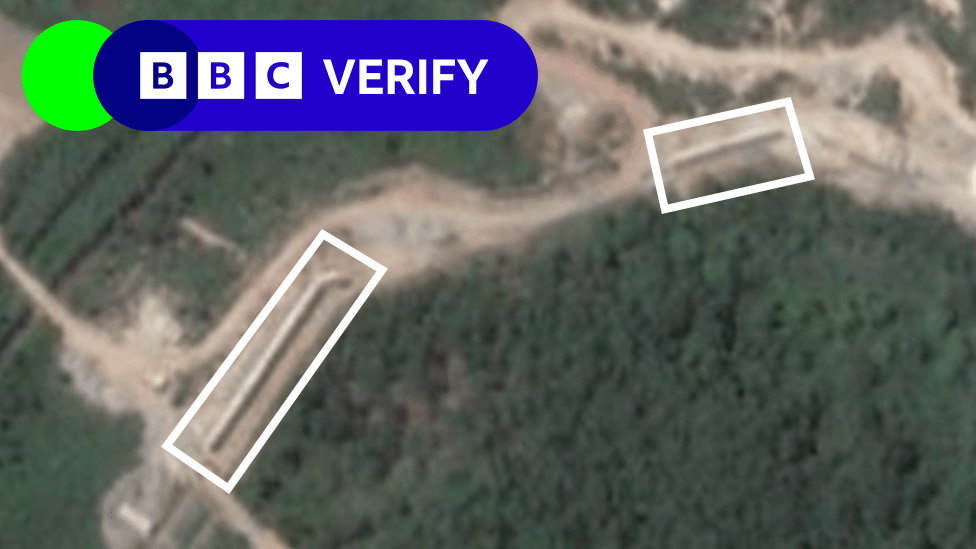Drones, threats and explosions: Why Korean tensions are rising

Visitors use binoculars to look at the North Korean side of the Demilitarised Zone (DMZ) dividing the two Koreas
- Published
North Korea has accused South Korea of flying drones into its capital, ratcheting up tensions that have been simmering for months.
The drones allegedly scattered propaganda leaflets over Pyongyang in what the North described as a provocation that could lead to "armed conflict and even war".
After levelling these allegations at the South on Friday, Pyongyang said it had ordered border troops to be prepared to fire. South Korea in turn said it was ready to respond, and warned that if the safety of its citizens was threatened it would signal the "end of the North Korean regime."
Then, on Tuesday, the North blew up sections of two roads that connected it to South Korea, making good on an earlier threat. The next day, it claimed that 1.4 million young North Koreans had applied to join or return to the army.
These flare-ups are the latest in a string of exchanges between the two Koreas, which have seen tensions rise to their highest point in years since the North's leader Kim Jong Un declared in January that the South is his regime's number one enemy.
What is happening?
On 11 October, North Korea's foreign ministry accused the South of sending drones to Pyongyang at night over the course of two weeks. It said that leaflets dispersed by the drones contained "inflammatory rumours and rubbish".
Kim's influential sister, Kim Yo Jong, warned Seoul of "horrible consequences" if the alleged drone flights happened again. She later said there was "clear evidence" that "military gangsters" from the South were behind the alleged provocations.
North Korea has released blurry images of what it said were the drones flying in the sky, as well as pictures allegedly showing the leaflets, but there is no way of independently verifying their claims.
While South Korea initially denied flying drones into the North, its Joint Chiefs of Staff later said that it could neither confirm nor deny Pyongyang's allegation.
There has been local speculation that the drones were flown by activists, who have been sending the same materials to the North using balloons.
Park Sang-hak, the leader of the Free North Korea Movement Coalition, denied North Korea's claim about the drone incursion, stating, "We did not send drones to North Korea".
On Monday, Kim met the head of the army, military chiefs, the ministers of state security and defence, and top officials, the North's official news agency KCNA said.
There, Kim set the "direction of immediate military action" and tasked officials with the "operation of the war deterrent and the exercise of the right to self-defence".
South Korea's Joint Chiefs of Staff public relations officer, Lee Sung-joon, said the North could mount "small-scale provocations" such as small explosions on roads connecting the Koreas.
Then came the explosions at the symbolic Gyeongui and Donghae roads.
Watch moment North Korea blows up roads connecting to South Korea
While both roads have long been shuttered, destroying them sends a message that Kim does not want to negotiate with the South, according to analysts.
Following the explosions, the South Korean military said it had fired weapons on its side of the border as a show of force, and had heightened surveillance of the North.
Hours later, the government of Gyeonggi Province, which surrounds Seoul, designated 11 inter-Korean border areas as "danger zones" in a bid to stop people from sending anti-North propaganda leaflets across the border.
"Gyeonggi Province has determined that the act of scattering leaflets toward North Korea is an extremely dangerous act that could trigger a military conflict," Kim Sung-joong, vice governor of Gyeonggi Province, said in a media briefing.
The scattering of such leaflets could threaten the "lives and safety of our residents", Kim added, as "inter-Korean relations are rapidly deteriorating".
Watch: Rubbish-filled balloon saga explained… in 63 seconds
- Published29 May 2024
What does this show?
Analysts say the drone incident suggests that North Korea is shoring up internal support by making it appear as though threats against the country are escalating.
Using terms like "separate states" in reference to the South, and dropping words like "compatriots" and "unification", is part of this strategy, said Professor Kang Dong-wan, who teaches political science and diplomacy at Dong-a University in Busan.
"The North Korean regime relies on the politics of fear and needs an external enemy," Prof Kang said. "Whenever tensions rise, North Korea emphasises external threats to boost loyalty to the regime."
Analysts say the tit-for-tat between the two Koreas shows how they are locked in a "chicken game", with both sides unwilling to blink first.
"Neither side is willing to make concessions at this point," said Professor Kim Dong-yup from the University of North Korean Studies in Seoul.
As there is mutual distrust, Seoul "needs to strategically consider how to manage the crisis", Prof Kim added.
Are the Koreas headed for war?
Not at the moment, analysts say.
"I doubt that the situation would escalate to the level of war. North Korea is exploiting military confrontation to strengthen internal cohesion," Prof Kang said.
“I question North Korea's ability to initiate a full-scale war. The regime is well aware of the severe consequences such a conflict would bring,” Prof Kim said.
The most recent spat over alleged drone flights will most likely remain a "verbal fight", said Prof Nam Sung-wook, who teaches North Korean studies at Korea University in Seoul.
Because Seoul and Pyongyang know that they can't bear the cost of a full-blown war, Prof Nam said, "the likelihood of actually using nuclear weapons is low".
Is North Korea's leader actually considering war?
- Published23 January 2024
What is the big picture?
The two Koreas are technically still at war since they did not sign a peace treaty when the Korean War ended in 1953.
Reuniting with the South had always been a key, if increasingly unrealistic, part of the North's ideology since the inception of the state - until Kim abandoned reunification with the South in January.
Kim has brought North Korea closer to Russia under Vladimir Putin, placing him at odds with the US and the West, which are South Korea's key allies.
Also significant are North Korea's long-standing ties with China, arguably its most important ally. In the wake of the drone incident, a spokesperson from China's foreign ministry on Tuesday called on all parties "to avoid further escalation of conflicts" on the peninsula.
Tensions in the Korean peninsula are rising as the US presidential campaign enters the home stretch.
Related topics
- Published28 June 2024

- Published21 June 2024
